Young People See Cars As Status Symbol Finds Continental Study
- By MT Bureau
- October 30, 2024
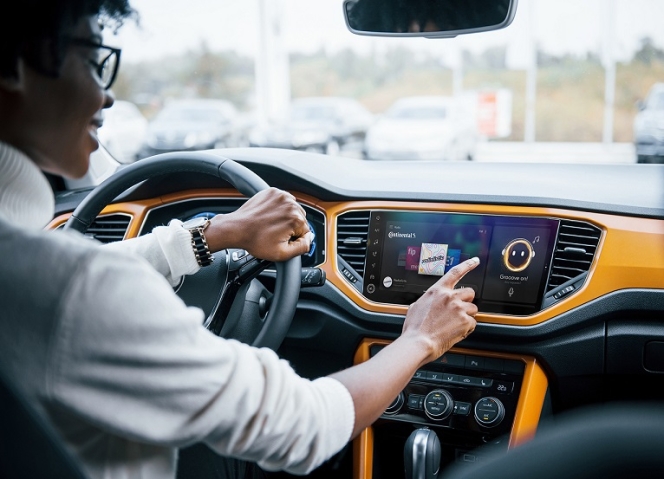
German tier 1 supplier Continental recently commissioned a representative mobility study in August 2024 to understand the perception about young people on mobility needs.
For the Mobility Study 2024, infas was commissioned by Continental in August 2024 to survey a total of around 5,000 people aged 18 and over in Germany, China, France, Japan and the USA about their mobility habits and attitudes to a variety of mobility issues. In each country, the respective sample is representative of the population; for China, it is representative of the urban population. The aim of the Continental Mobility Study, now in its eighth edition since 2011, is to provide an international comparison of people’s attitudes toward current and future developments in mobility and their personal usage habits. The range of topics covered in this year’s study included automated driving, user experience, AI in cars, sustainable mobility concepts, mobility in urban areas, the affordability of mobility and attitudes toward government regulation in the mobility sector.
The key findings found that overall, 84 percent of car owners in Germany, regardless of age, believe that it is important to own a car. For almost 90 percent, having a car is essential for shopping and running other errands. The majority of young people in Germany are particularly enthusiastic about technological advances in cars. They look forward to the benefits self-driving cars will offer in terms of being able to read, play video games or work (51 percent of 25 to 34-year-olds). In addition to autonomous driving, artificial intelligence (AI) in the form of digital voice assistants is very popular with this group. There is a similar level of approval in the four other countries surveyed in the study.
Philipp von Hirschheydt, Executive Board member responsible for the Automotive group sector, Continental, said, “The findings show that the response to new technologies such as automated driving, large displays and AI in cars varies greatly between generations and also between countries. That’s why we aim to provide customised solutions – market-specific, tailor-made and modular.”
The findings of the study also reveal the current status of the trend toward lower-emission mobility worldwide. Particularly striking is that acceptance of fully electric cars remains low.
In Germany, only 3 percent of all car owners have an electric vehicle. However, just over a third of respondents who do not yet own an electric vehicle believe their next car will be fully electric (39 percent, compared with 34 percent in 2022). By contrast, hybrid drives are highly popular across all countries. In Germany (48 percent) and the USA (47 percent), nearly half of respondents who do not own an electric car can imagine their next vehicle being a hybrid with a combustion engine and an electric motor.
In China, that figure rises to almost nine out of 10 respondents (86 percent). This means that hybrid cars could increasingly bridge the gap to e-mobility and give it a renewed boost. With a share of 68 percent, younger people in Germany aged between 25 and 34 are particularly interested in electric cars – also compared with their international peers.
Vehicle as a status symbol
On the one hand, younger people up to the age of 34 in Germany do not feel that attached to cars. For them, more than for older respondents, it is one of many means of transportation available. On the other hand, generation Y and Z drivers born in the 1990s and later have a clear emotional connection to their cars: for more than half of 18 to 34-year-olds (54 percent) in Germany, cars are regarded as a status symbol – twice the share among respondents aged 45 and over. People aged between 18 and 34, particularly those living in large cities, see cars as a prestige item (67 percent). In small towns and rural areas, the approval rate is around 49 percent. This view of the car is accompanied by growing expectations. Of the 25 to 34-year-olds surveyed, for example, 51 percent believe that cars of the future should not only be a safe means of transportation, but also a place to relax and work.
Tech attracts young people
The study also found that younger people in Germany also had a positive attitude toward highly automated and autonomous driving, with around two-thirds (65 percent) of 18 to 34-year-olds seeing this as a useful development. Among older respondents aged 55 and over, 39 percent share this view. Around two-thirds of younger people up to the age of 34 also believe that state-of-the-art technologies should be mandatory in newly registered cars in order to make traffic even safer – a viewpoint that signals approval of the EU directive requiring certain advanced driver assistance systems in new cars, which has been in force since July 2024.

Another future technology that is particularly popular with younger people is AI assistants in cars. Almost three-quarters of respondents (74 percent) between the ages of 18 and 34 would welcome an AI voice as a service that, like a virtual travel companion, provides useful information about sights and restaurants along the route, finds the nearest gas or charging station, searches for free parking spaces or even compiles personal messages.
“Younger people in particular have changing expectations of cars. These are closely linked to pioneering technologies such as automated driving, which deliver new user experiences. At Continental, we’re already equipping cars with AI. Together with our partner Google Cloud, we have developed a virtual companion for drivers. We are particularly proud to be one of the first automotive suppliers worldwide to integrate Google Cloud applications directly into our vehicle computers,” added Hirschheydt.
Autonomous & AI
The comparison between countries reveals a widespread openness to highly automated and autonomous driving in Asia across all age groups. In China, nine out of 10 respondents (90 percent) view the relevant technologies as a useful development, while in Japan, almost three-quarters (72 percent) share this sentiment. In France (60 percent) and the USA (56 percent), more than half of those surveyed have a positive attitude. In Germany, around one in two respondents (49 percent) feel the same. An AI-powered virtual travel companion is particularly popular in China, where nine out of 10 respondents (91 percent) say they would like to have such a service. In the USA (66 percent) and Japan (63 percent), around two-thirds express this wish, while in France (58 percent) and Germany (57 percent) more than half would be happy to have the technology.
There is broad agreement across all countries on the ideal size of a car display for infotainment content. Most people prefer larger displays, with 90 percent of respondents in China favouring this option.
In Germany (81 percent), France (79 percent) and the USA (80 percent), eight out of 10 respondents would like their navigation, vehicle data and music to be shown on large screens.
In Japan, the figure is more than two-thirds (69 percent). However, preferences differ significantly when it comes to technological details. While the majority of respondents in Japan (79 percent) and more than half in Germany (57 percent) prefer a simpler display on car screens, a slight majority in the USA (58 percent) favour more colours. By contrast, many features are popular in China (69 percent). In Japan (70 percent), the majority prefer a more straightforward digital design, while in Germany, around half feel the same way (55 percent).
There are also differences between countries when it comes to the question of whether a display should be controlled by voice or manually: voice control is particularly popular in Japan (67 percent), more than half are in favour of it in China (59 percent), while the number is significantly lower in Germany (43 percent). In the USA, just over half (55 percent) also prefer to operate a display manually.
Hybrid
The study shows that hybrid drivers in Germany have an above-average interest in all-electric mobility – a strong indication that hybrid cars can play a key role as a bridging technology for the transition to fully electric drives.
For example, 43 percent of respondents who currently use a vehicle with a combined combustion engine and electric motor say that their next car will definitely be an all-electric vehicle. Those who drive a gasoline or diesel vehicle are significantly less open to such a switch (12 and 19 percent respectively). In addition, a clear majority (58 percent) of hybrid drivers would be willing to buy an electric car without a government subsidy.
The data suggests that hybrid vehicles are boosting people’s confidence in e-mobility and may help reduce any reservations about fully electric vehicles. One group with significant future potential for this development is the 48 percent of respondents who do not drive an electric or hybrid car and for whom an all-electric car is not currently an option, but who are considering a hybrid as their next car.
Varying degree in e-cars
The shift to electric mobility is under pressure in Germany, where sales of all-electric cars are faltering. According to the latest figures of the Continental study, electric cars represent a significant share (10 percent) of the overall passenger-car fleet in China, while only 3 percent of respondents in Germany drive an all-electric car and 91 percent a car with a combustion engine (China: 80 percent). There is potential for higher sales of electric cars in Germany, particularly among those aged 18 to 34. In this age group, around two-thirds (64 percent) of respondents believe it is certain or likely that their next car will be fully electric – a trend that gradually diminishes in older generations.
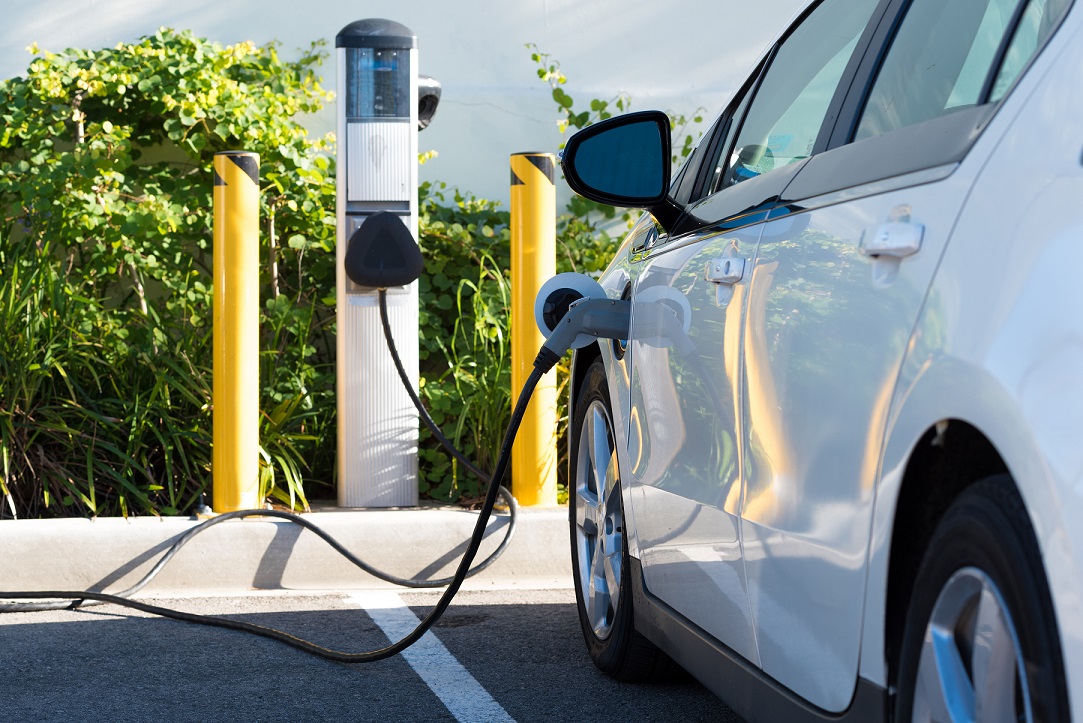
A look at age-dependent attitudes toward electric mobility reveals that, like many other technological developments, e-mobility is more appealing to younger drivers than older ones. They are more willing to forgo subsidies: 50 percent of 25 to 34-year-olds would consider buying an electric car without government assistance. However, the willingness to fully finance an electric vehicle decreases significantly among those aged 45 and older.
EVs and subsidy
The study found that two-thirds of respondents in Germany link the purchase of an electric car to a government subsidy is an expression of their concerns about being unable to finance an electric car on their own. In Germany, 71 percent of respondents worry that mobility will no longer be affordable due to rising energy prices. In the 2022 Mobility Study, 73 percent of people in Germany expressed their concerns about the affordability of mobility.
What’s more, 65 percent of respondents fear that they will not be able to afford an electric car in the near future and 56 percent are worried that driving could soon become too expensive for them. As a result, a clear majority (80 percent) expect policymakers to create the framework conditions to ensure that driving remains affordable. At the same time, they believe driving should be made more sustainable in the most cost-neutral way possible. Almost three-quarters (73 percent) of respondents think that the cost of environmentally friendly cars needs to fall. Regulatory interventions such as a speed limit of 130 kmph on highways are met with acceptance (62 percent), provided they do not lead to price increases. Younger respondents are less price-sensitive. They are much more prepared to pay a premium for environmentally friendly cars, especially if they are completely carbon-neutral in production and operation (40 percent of 18 to 24-year-olds compared with 13 percent of 45 to 54-year-olds).
Sustainable tyres
Sustainability is an important concern for people with cars is also demonstrated by their attitude to tyres. According to the study, almost eight out of 10 drivers in Germany (84 percent) who also value tyre recycling consider it important that their tyres contain an increasing share of environmentally friendly materials. When purchasing tyres, younger people (61 percent of 25 to 34-year-olds) are more concerned than older people about what happens to the tyres at the end of their service life.
Furthermore, 44 percent of car owners in Germany would be willing to pay a premium for tyres made from a higher share of renewable and sustainable materials. Here again, this willingness is most pronounced among 25 to 34-year-olds (65 percent).
- BYD India
- BYD
- Build Your Dreams
- SAMTA BYD
- Rajeev Chauhan
- BYD Sealion 7
- BYD Seal
- BYD Atto 3
- BYD eMAX 7
- Bhupesh Sahni
- Bhanu Ketarpal
BYD Opens It’s 42nd Dealership Showroom In India
- By MT Bureau
- July 18, 2025

BYD India, a subsidiary of China-headquartered BYD (Build Your Dreams) a leading manufacturer of electric vehicles, inaugurated its 42nd dealership showroom in the country.
The new facility, located in Sonipat, Haryana, was launched in association with SAMTA BYD (Samta Greentech), further strengthening BYD’s growing presence in the Northern part of India.
The showroom spread across 2,000 sqft will showcase BYD’s all-electric vehicle range, provide test drives, financing options and aftersales support. It will display the company’s electric passenger vehicle lineup consisting of the BYD Sealion 7, BYD Seal, BYD Atto 3 and the BYD eMAX 7.
Rajeev Chauhan, Head of Electric Passenger Vehicles Business, BYD India, said, “The launch of our 42nd showroom in India reflects BYD’s continued commitment to expanding clean mobility across key regions. Haryana is a high-potential EV market, and with partners like SAMTA BYD, we are confident in delivering not just world-class electric vehicles, but also a seamless and engaging customer experience. Sonipat is an important step in our journey to bring sustainable innovation closer to communities across India.”
Bhupesh Sahni (Director) & Bhanu Khetarpal (Director) of SAMTA BYD, said, “We are proud to partner once again with BYD in bringing cutting-edge sustainable mobility solutions to Sonipat. With increasing awareness and demand for sustainable transportation, our new facility is well-positioned to cater to the needs of this growing market."
- Jeep India
- Jeep Trail Editions
- Jeep Trust programme
- Jeep Compass
- Jeep Meridian
- Jeep Compass Trail Edition
- Jeep Meridian Trail Edition
- SUVs
Jeep India Launches Trail Editions Of Compass And Meridian SUVs
- By TT News
- July 17, 2025
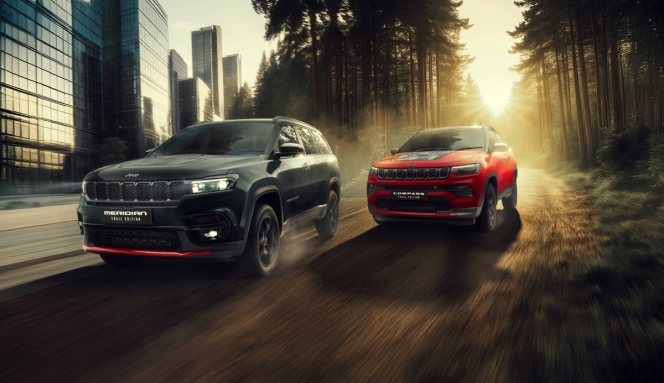
Jeep India has unveiled the rugged Trail Editions of its popular SUVs – the Jeep Compass and Jeep Meridian – combining bold styling with exclusive ownership benefits under the new ‘Jeep Trust’ programme. Available from 15 July 2025, these special editions cater to adventure enthusiasts seeking distinctive design and enhanced value.
The Jeep Compass Trail Edition features striking exterior upgrades, including Trail Edition decals, a matte black grille and Neutral Grey accents on key elements like the roof rails, ORVMs and badges. It rides on 18-inch Granite Metallic alloy wheels, while the interior sports black leatherette upholstery with red contrast stitching, a dark camouflage motif and Trail Edition-branded floor mats.
Meanwhile, the Jeep Meridian Trail Edition exudes premium ruggedness with a high-gloss black roof, signature hood decals and Neutral Grey highlights on the grille and cladding. Piano Black accents and red front fascia details complete its bold stance. Inside, it offers a black vinyl cabin with ruby red accents, camouflage appliques and skid plates for an adventurous touch.
The ‘Jeep Trust’ programme enhances ownership with added benefits. Compass Trail buyers receive a 3-year maintenance package, a 5-year warranty and an INR 20,000 cash benefit, while Meridian Trail owners get a complimentary 3-year maintenance plan.
Priced between INR 2,541,000 and INR 3,727,000 (ex-showroom), the Trail Editions are based on the Compass Longitude (O) and Meridian Limited (O) variants, retaining their core features while adding exclusive styling and value-packed ownership perks. Available for a limited time, these models can be booked at Jeep dealerships across India.
Kumar Priyesh, Business Head and Director – Automotive Brands, Stellantis India, said, “The Trail Editions reflect the Jeep brand’s core values of freedom, adventure, authenticity and passion. These bold new editions provide a differentiated ownership experience for customers who want to stand out — both on and off the road. With the addition of the Jeep Trust programme, we are reaffirming our commitment to offering value beyond the drive.”
India’s Auto Industry Posts Mixed Q1 Performance as Passenger Vehicle Exports Hit Record High
- By MT Bureau
- July 15, 2025
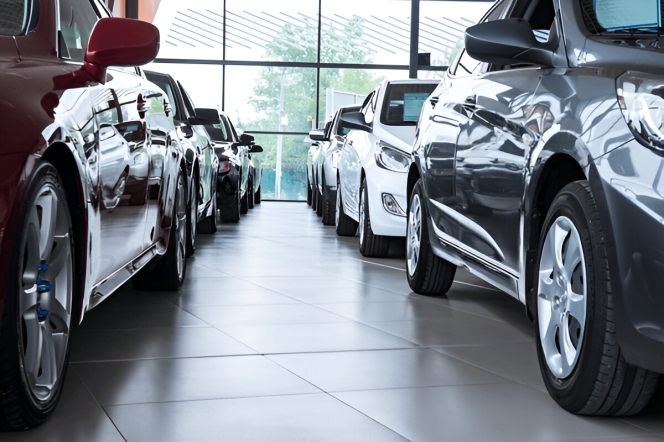
India’s automobile industry delivered a mixed performance in the first quarter of 2025-26, with passenger vehicle exports reaching an all-time high even as domestic sales remained largely flat, according to data released by the Society of Indian Automobile Manufacturers (SIAM) on Monday.
Passenger vehicle sales crossed the one million mark for the second consecutive year in Q1, reaching 1.01 million units, though this represented a 1.4 percent decline compared to the same period last year. The segment’s performance was buoyed by utility vehicles, which now account for 66 percent of passenger vehicle sales and posted 3.8 percent growth, whilst passenger cars declined 11.2 percent.
The standout performer was exports, with passenger vehicles achieving record Q1 exports of 204,000 units, marking a 13.2 percent year-on-year increase. This surge was driven by stable demand across most markets, with particularly strong performance in the Middle East and Latin America, alongside recovery in neighbouring markets such as Sri Lanka and Nepal.
"The performance of the Auto industry was relatively flat, though the retail registration for Passenger Vehicles, Two-Wheelers and Three-Wheelers were marginally higher than the previous Q1," said Shailesh Chandra, President of SIAM.
The two-wheeler segment faced headwinds with wholesale sales declining 6.2 percent to 4.67 million units due to inventory correction across the industry. However, retail registrations increased 5 percent during the quarter, driven by the marriage season and positive demand sentiments. Two-wheeler exports showed robust growth of 23.2 percent to 1.14 million units.
Three-wheelers achieved their highest-ever Q1 sales of 165,000 units, representing marginal growth of 0.1 percent. The segment benefited from increased economic activity supporting urban transportation demand and easier financing options. Exports in this category surged 34.4 percent to 96,000 units.
Commercial vehicles posted a marginal decline of 0.6 percent to 223,000 units, though exports grew strongly by 23.4 percent to around 20,000 units.
Looking ahead to Q2, SIAM expressed cautious optimism despite ongoing challenges. The upcoming festive season is expected to drive demand, particularly for passenger vehicles and two-wheelers, whilst an above-normal monsoon could aid rural income recovery.
"With the upcoming festival season coupled with the benefits of RBI repo rate cuts, we expect consumer sentiments to improve," Chandra added.
The Reserve Bank of India's cumulative repo rate cuts of 100 basis points over the past six months are expected to gradually ease borrowing costs, potentially boosting consumer sentiment and affordability.
However, supply-side challenges persist, particularly the recent export licensing requirement from China on rare earth magnets, which has raised concerns for original equipment manufacturers across all categories.
"Sales of Passenger Vehicles in Q1 of 2025-26 de-grew by (-) 1.4 percent, posting sales of 1.01 million units as compared to Q1 of previous year," said Rajesh Menon, Director General of SIAM.
In June alone, passenger vehicle sales declined 7.4 percent to 312,849 units, whilst two-wheeler sales fell 3.4 percent to 1.56 million units. Three-wheeler sales bucked the trend with 3.8 percent growth to 61,828 units.
The industry's overall domestic sales fell 5.1 percent in Q1 to 60.75 million units, reflecting the challenging operating environment facing India's automotive sector.
Skoda Auto India Surpasses 300 Touchpoint Across 172 Cities
- By MT Bureau
- July 14, 2025
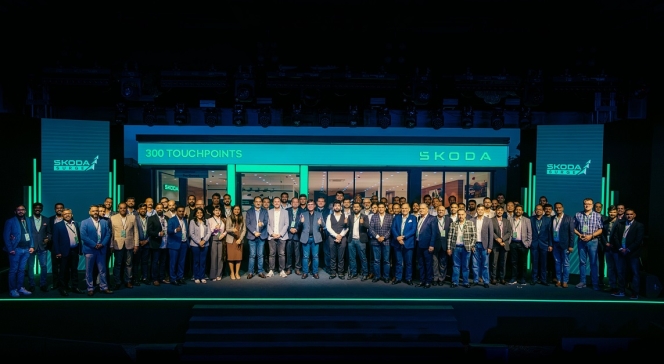
Czech automotive brand Skoda Auto India has announced that it has achieved a new milestone by surpassing 300 customer touchpoints in the country. With this, the OEM has a network of touchpoints in 172 cities across the country and is rapidly expanding its presence in not just tier 1 cities, but also tier 2 and tier 3 markets.
Interestingly, 86 percent of the recent expansion have happened in these geographies and 75 percent of the 300 touchpoints are directly servicing customers in the same cities.
The Czech automaker is marking its 25th anniversary in the country and 130 years globally. It was just recently, Skoda Auto India reported its highest-ever half-yearly sales in the first half of 2025.
Ashish Gupta, Brand Director, Skoda Auto India, said, "Our growing network makes our product range more accessible to customers, while enabling smarter, faster service with consistent quality, across the country. With a strong emphasis on ‘growing together and getting closer to customers’, a large part of our expansion has been undertaken with Skoda Auto’s long-term dealer partners in India, while also bringing new partners with a proven track record of customer centricity into the fold. This expansion is a step forward in strengthening Skoda Auto’s legacy in India and delivering on our promise of safety, value, and a truly rewarding ownership experience."
The expansion the company shared perfectly complements its product strategy, which has been significantly boosted by the Kylaq SUV, joining the Kushaq and Kodiaq to offer an ‘SUV For Everyone.’ The Slavia continues the brand's sedan legacy, with a new global icon expected to launch in India soon.


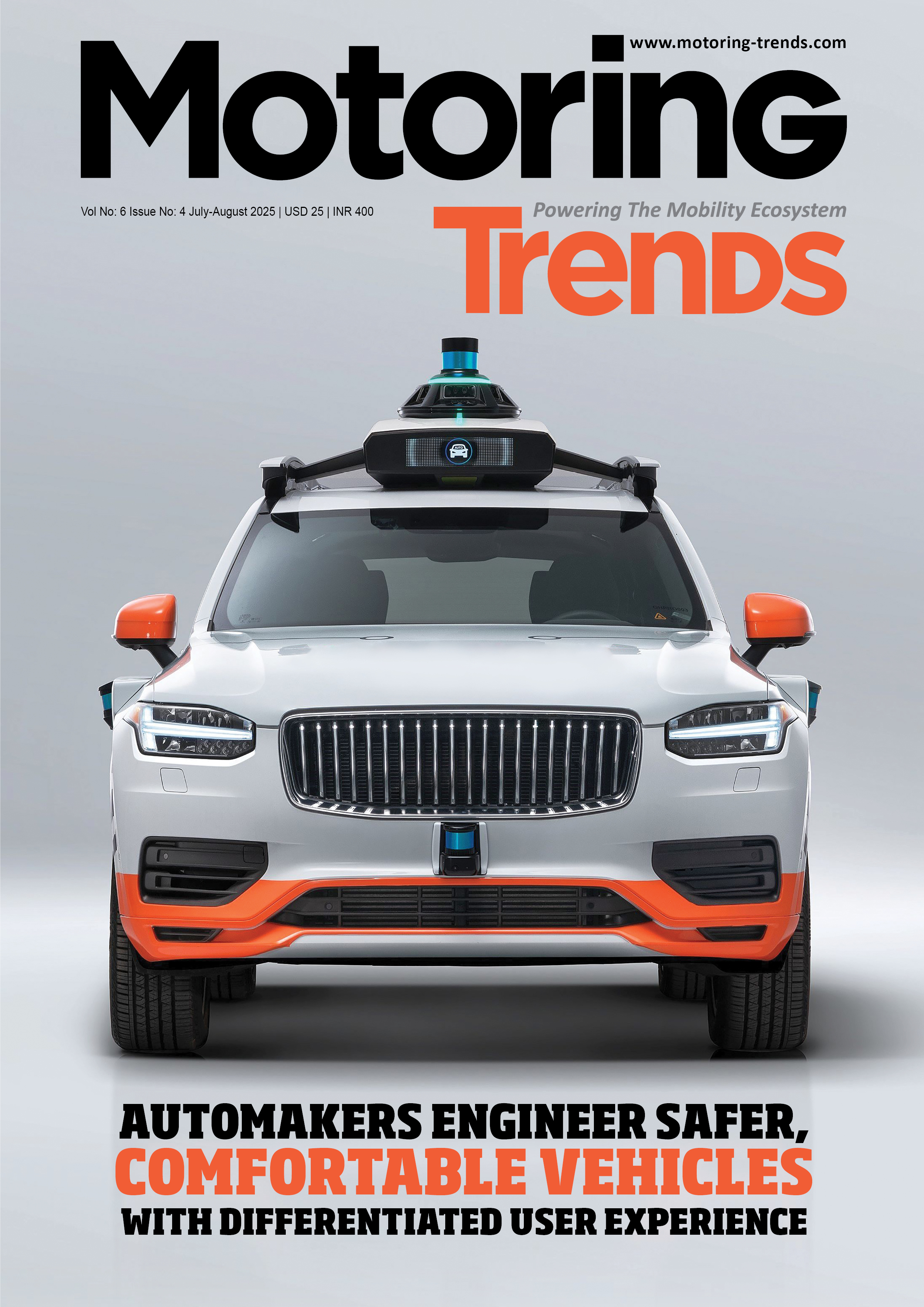
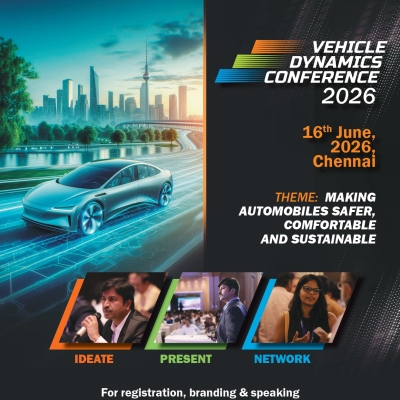
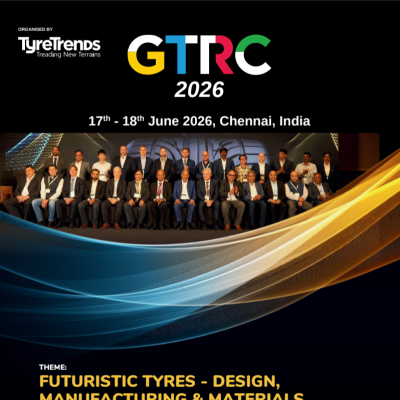
Comments (0)
ADD COMMENT